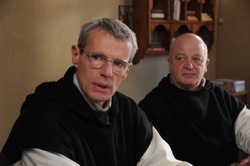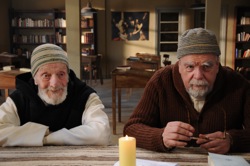
One of the many atrocities during the Algerian Civil War, between the government and extremist Islamic rebel groups, was the 1996 kidnapping and murder of seven French Cistercian monks. Of Gods and Men tells the story of those monks not as a detailed historical account (what actually happened to the monks and who killed them are questions still being investigated) but as an exploration of the kinds of people those monks were. A highly spiritual order, their mission was to help the suffering and the film demonstrates their strong relationship with the local Muslim population. As terrorist violence starts to affect their small community the monks have to decide whether to stay or leave.
Director and co-writer Xavier Beauvois creates an impression of the monastic life through a series of observational moments. The audience sees the monks in prayer, tending to their chores, studying and simply passing silently through the monastery halls. Life is disciplined and serene. Beauvois also depicts the way the monks interact with the local villagers, providing medical treatment, providing charity, working at the market and even giving advice about love. The naturalistic performances and Beauvois’s almost documentary style of filmmaking means that Of Gods and Men always feels sincere. The monks emerge as remarkable men whose faith is less motivated by dogma than compassion, intelligence, introspection and a powerful sense of duty to help others.
The stylistic restraint used throughout Of Gods and Men means that moments of emotional vulnerability are felt extremely profound. The monks are mostly reserved, displaying their kindness and the pleasure they take in the happiness of others through a twinkle in the eye rather than broad facial expressions. So when they do privately break down in rare moments of uncertainty or despair, the enormity of what they are feeling is fully conveyed.

There is no musical score in the film so that the only music heard are the chants by the monks and the overture from Tchaikovsky’s Swan Lake, which is played in a key scene towards the end of the film. The music is presumably one of the few indulgences the monks allow themselves and the obviousness of such a blatantly emotive piece of music in this context becomes very touching. During this sequence the camera gradually gets closer and closer to each monk so that eventually only their eyes fill the screen, highlighting their conflicting feelings of joy about what they have achieved and despair about what is to come. The scene overtly takes on The Last Supper symbolism and like Jesus, the monks are preparing to take on the sins of the world and forgive the sinners. It’s a profound moment that captures the monks as both human beings and men devoted to the values of Christianity in their purest form.
Of Gods and Men does not shy away from demonstrating the harm that can be done when religion is strategically interpreted for political gain, and the film ensures that the differences between the local Muslims villagers and the in-name-only Muslim terrorists are pronounced. The monks are deeply respectful and knowledgeable about Islam and share more of the values of the local villagers than the terrorist extremists do. Whether their religious beliefs are the reason for the monks being such courageous and selfless men or simply incidental is not the point as Of Gods and Men aims to celebrate who they were without glossing over the difficult choices they had to make. The results are a wonderfully humanist film about a tragic story.
![]()
